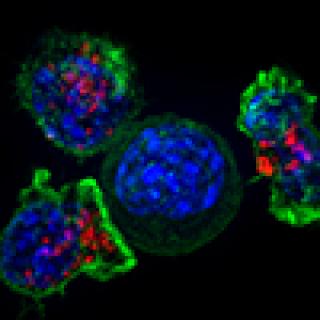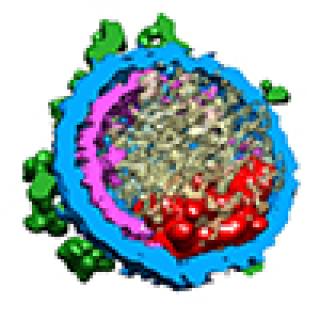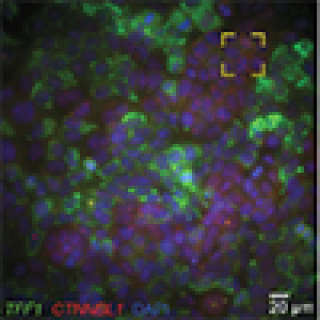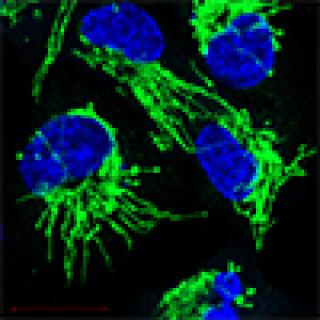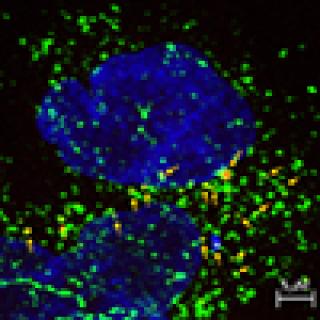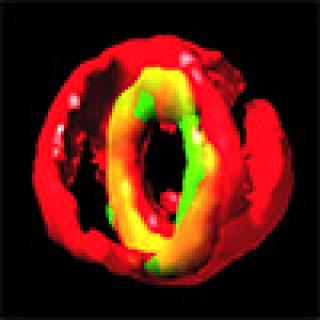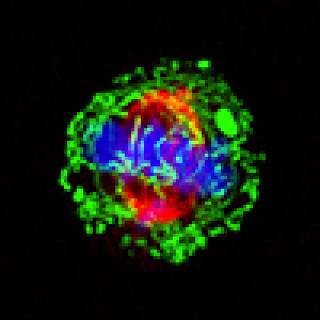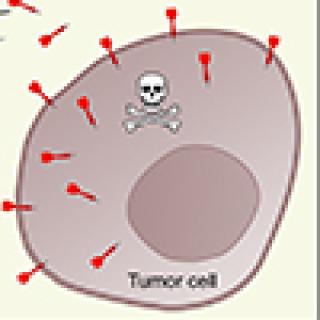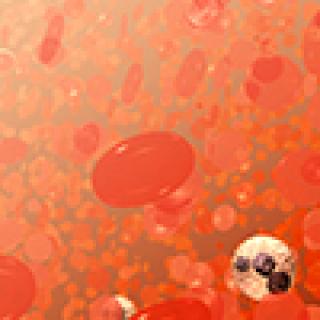Our Discoveries
Clinical trial finds combination therapy effective for some biliary cancer patients
Completion of a phase I/II clinical trial found that two of 20 patients with biliary tract cancer disease experienced a partial response to treatment with the immune checkpoint inhibitor tremelimumab combined with microwave ablation therapy. Further studies are needed to understand why just a few patients responded well to this combination treatment.
Read MoreSecond-generation maturation inhibitors show promise for HIV treatment
CCR researchers have improved upon bevirimat, a first-generation maturation inhibitor developed to treat HIV-1, the primary cause of AIDS. After pinpointing HIV-1 strains not effectively blocked by bevirimat during clinical trials, researchers developed second-generation inhibitors based on knowledge about the sequences of those resistant strains. The new inhibitors turned out to be more potent and active than bevirimat.
Read MoreSophisticated technology reveals gene expression in real time
CCR researchers made use of CRISPR-Cas9 and other technology to reveal gene expression in real time, demonstrating that RNA synthesis is highly variable due to long intervals between RNA production. The research supports the emerging awareness about the dynamic nature of gene expression and the tremendous variability among genes.
Read MoreProtein mutations lead to human disease by altering a cancer-promoting pathway
Working in collaboration with a team of other scientists, CCR researchers identified the role that the LZTR1 protein plays in disrupting the RAS pathway. It interferes with signaling, largely by dysregulating ubiquitination, a process defined as the attachment of a small protein called ubiquitin to a protein that is degraded by an enzyme.
Read MoreNew therapies tested in mice provide a one-two punch for treating liver cancer
Biopharmaceutical agents that combine the precision of cancer-specific antibodies and the potency of drugs toxic to harmful cells are increasingly being used to treat cancer. A team in CCR has identified two such agents for liver cancer, which were both found to reduce tumor size and prolong survival in mice.
Read MoreStudy reveals function of protein crucial to survival of Staph infections
A team led by Kumaran Ramamurthi, Ph.D.,Senior Investigator in the Laboratory of Molecular Biology, has identified why the GpsB protein is essential for the survival of Staphylococcus aureus, a leading source of infection in cancer patients in hospital settings. These findings, published in eLife, point to GpsB as a possible antibiotic target.
Read MoreStudy reveals regions where harmful DNA breaks are most likely to occur
Center for Cancer Research investigators have discovered that double-strand DNA breaks—the most dangerous form of DNA damage, which can lead to cancer—tend to occur during DNA replication at regions known as poly(dA:dT) tracts. Their findings represent a first step toward investigating ways to prevent these harmful DNA breaks.
Read MoreCommitting to cell division may be clue to cancer cell growth
In a new study in Nature, CCR researchers describe, for the first time, how a cell commits to dividing during the cell cycle. Since cancer cells divide when they should not, targeting this pathway might stop their inappropriate growth.
Read MoreAntibody-linked drug shrinks various types of tumors in preclinical study
A preclinical study by Center for Cancer Research investigators and colleagues shows that a drug guided by an attached target-seeking antibody can recognize cells infiltrating tumors, the tumor stroma, and cause various types of tumors to shrink, and in many cases, disappear. Their findings suggest that when stromal cells take up the ADC, they cleave the drug from the antibody and release it to kill neighboring tumor cells.
Read MoreActivated platelets can promote tumor cell invasion into healthy tissue
Pre-clinical studies conducted by CCR investigators and colleagues show that platelets, tiny cells that promote blood clotting, when activated by the CD97 protein on the surface of tumor cells, enable the tumor cells to invade healthy tissue and then metastasize. The study, published April 17, 2018, in Cell Reports, was led by Kathleen Kelly, Ph.D., Chief, Laboratory of Genitourinary Cancer Pathogenesis.
Read More